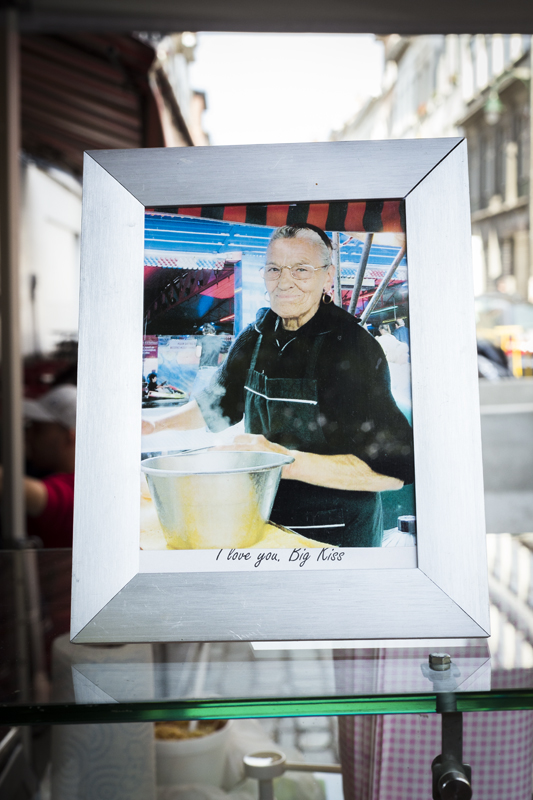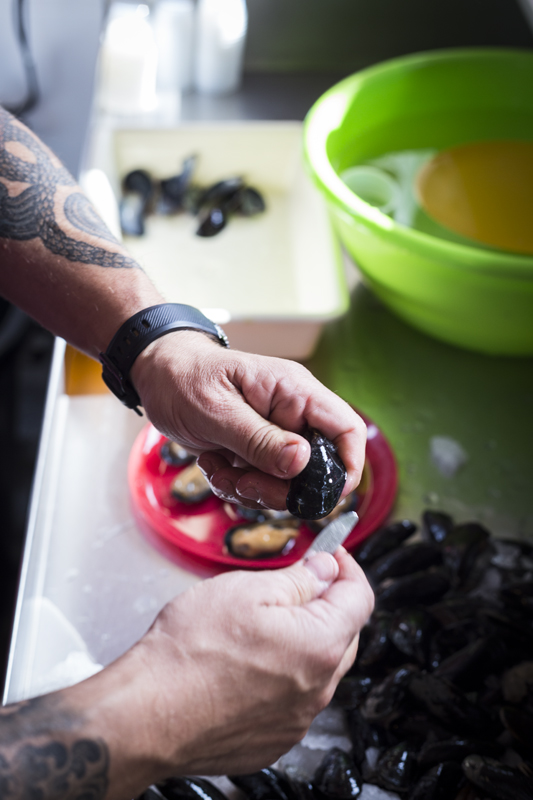This article originally appeared on MUNCHIES France.In Belgium, raw mussels are considered the stuff of connoisseurs, a sort of legendary dish appreciated only by old folks. According to tradition, these "poor man's oysters" were originally one of the most popular plates in Marolles—the neighborhood of Brussels that's long been home to the city's most disadvantaged people—before the dish became bourgeoise.
Advertisement
These moules parquées, or "parked mussels"—because they were typically arranged one next to the other like cars in a lot, or because one penned them in a tank of clean water to wash off any dirt and impurities—were sold as soon as they were extricated from the sea.
Stéphane behind his legendary food truck.
The mussels wait in the fridge.
Raw mussels quickly became a symbol for the city. They're a dish that costs next to nothing, one that could be found easily and only requires a few simple steps: Open them, clean them, and eat them.Eating fresh, live mussels is still possible in Brussels today. Street fairs and markets are priority targets for mussel merchants, maybe because the festive spirit that prevails at fairs is conducive to gluttony.
Stéphane's daughter working at the cart.
A plate in the making.
A street fair is also, in any case, one of the rare places where you can still find this particularly Belgian ambience. The smell of toy rifles from the carnival shooting gallery hangs in the air, mingling with the scent of fries and cotton candy, all of which is heightened by the superb Belgian accents heard all around.Stéphane de Rayemaeker is a vendor who specializes in the sale of live mussels: "We say 'parked' because they're parked one next to the other like in a garage, oh man!" His is a family practice that's been passed down from generation to generation.
The famous pot of escargots and broth.
"The food stall started a little over 55 years ago with my wife's great grandmother. She learned from another vendor at the fair," recalls de Rayemaeker. "Five or six years later, my wife's grandmother started helping her own mother out before eventually leaving to start her own business. Then, my mother-in-law took over the business with her sister and brother. Now, it's my and my wife's turn. Even my children get their hands dirty when they have to."
Advertisement

Diving in the migeole fieu sauce.
De Rayemaeker's food truck is a local staple that's known both for its food as well as its Brussels-specific local color. "One day, my wife's grandmother punched a guy who'd parked in front of her cart." The Brussels accent reigns here, and the clacking and opening of mussels is sweet music to the ears.

Raw mussels have never really crossed international borders like the cooked ones have, so they're not really a tourist thing, but sometimes Stéphane comes across curious people. "This year, a family passed by and they hadn't heard of raw mussels. As they didn't speak French and I don't speak English, I told them it was like Brussels-style sushi. Then they bought 10 euros' worth."Easy. Take some fleshy, fresh mussels and serve them with mustardy sauce. And most importantly, forget the fries.
Stéphane and his food cart are at la Foire du Midi from July to August, 90 boulevard du Midi, Brussels, Belgium.
